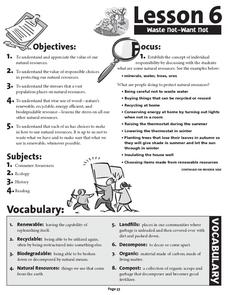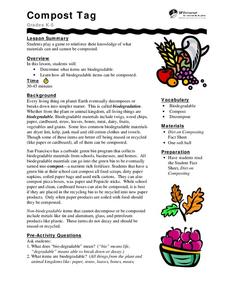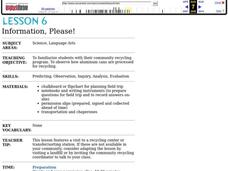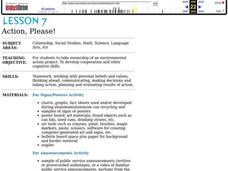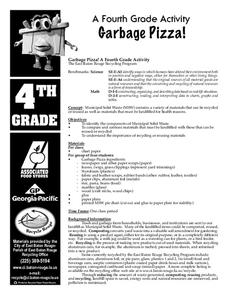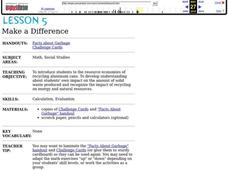Curated OER
Waste Not Want Not
Students are introduced to the need to save natural resources. Through inquiry, hands-on activities, and problem solving, students increase their understanding of solid waste materials and the need to reduce, recycle, and reuse.
Curated OER
Recycling!
The students recall events from Dr. Seuss' story The Lorax and make connections to environmental issues affecting their lives. They are expected to reflect on the facts of the story and respond verbally stating the inferences they made...
Curated OER
We Recycle!
Students discuss and brainstorm the need for recycling. They also learn what materials they use are recyclable. They are to start their own recycling center in their school. They promote recycling by using posters and other graphics.
Curated OER
Reduce, Reuse, Recycle
Students understand the process of recycling. They investigate how it improves the environment. They read the story "Don't Pollute" by Stan and Jan Berenstein. They analyze trash and sort it into bins.
Curated OER
Aluminum Altruism
Students explore the value of recycling. They consider the importance of giving back to their school community. They calculate their earnings using multiplication and addition.
Curated OER
Recycling Relay
Students improve their locomotor skills and their knowledge of recycling. They participate in a relay as they recycle different objects into their proper containers.
Curated OER
Texas Recycles Day: A Sample School-Wide Environmental Event
Students participate in a recycles day. They research how recycling benefits the environment. They also compete in a paper products recycling contest.
Curated OER
Recycling and Reusing
Students complete the associated worksheets as they investigate ways to recycle and reuse common objects. They share ideas on reusing objects while practicing listening, speaking and note-taking skills.
SF Environment
Compost Tag
Composting is a great way to get children involved in recycling. First, they discuss how biodegradable products decompose to make compost. Then, they talk about what can and cannot be composted. They play a game similar to around the...
Curated OER
Solid Waste
Students determine the percentage increase in output of solid waste in the U.S. They determine the length of time it takes for throw away items to decompose.
Curated OER
Information, Please!
Students explore their community recycling program and observe how aluminum cans are processed for recycling.
Curated OER
Make a difference
Students figure out math equations based on the recycling of cans and gas consumption. In this recycling lesson plan, students have challenge cards that ask them challenge questions on how to save gas and what a difference recycling can...
Curated OER
Action, Please!
Students share their knowledge about aluminum and aluminum recycling by sharing the information with the rest of the community.
Curated OER
Life Science- Useful Waste
Fourth graders explore the topic of waste and recycling. In this useful waste lesson, 4th graders classify objects and sort them into most usable and least usable categories. Students complete an activity sheet and have a discussion on...
Curated OER
How Long Does Trash Last
Students work in cooperative groups to estimate how long trash lasts in a landfill. They study environmental consequences of not recycling and use graph-making software to create a graph that illustrates the lifespan of trash items...
Curated OER
Earth Day Lesson
Young scholars analyze Earth science by answering environmental study questions. In this Earth Day instructional activity, students read the book The Lorax and identify the themes within it. Young scholars define several recycling...
Curated OER
Garbage Pizza
Fourth graders explore the concept of waste management. In this recycling lesson, 4th graders identify materials that must be landfilled as well as items that may be recycled or reused.
Curated OER
Now You See It, Now You Don't
Students explore organic and inorganic objects. In this environmental lesson students perform a composting experiment using flowers in different soils. Students record their observations.
Alabama Learning Exchange
Good Litter, Bad Litter
Which ones can be thrown on the ground? Discover the difference between natural litter and unhealthy trash, helping scholars by using several examples. Use the information here to give them a basic background, but also encourage prior...
Curated OER
Pollution
Young ecologists investigate some of the many ways that human activities adversely affect the environment. After identifying the main types of pollution (air, water, soil), 3rd graders fill in a Venn Diagram by pasting cut-out pictures...
Curated OER
Make a Difference
Middle schoolers are introduced to the resource economies of recycling aluminum cans. They develop understanding about their own impact on the amount of solid waste produced and recognize the impact of recycling on energy and natural...
Curated OER
Think Green
Students experience and practice compositing and recycling through hands-on-activities. They distinguish between which items from their trash can be recycled, composted and reused. The process for making recycled paper is also covered in...
Curated OER
All Wrapped Up
Students explore packaging. In this cross-curriculum lesson, students bring in samples of food packaging and identify the packaging as natural or manufactured.
Curated OER
Trash Flash Through Time
Students describe ways in which solid waste was disposed in the past and the present. They survey an older citizen about his/her solid waste disposal methods. They discover solid waste practices from long ago.


